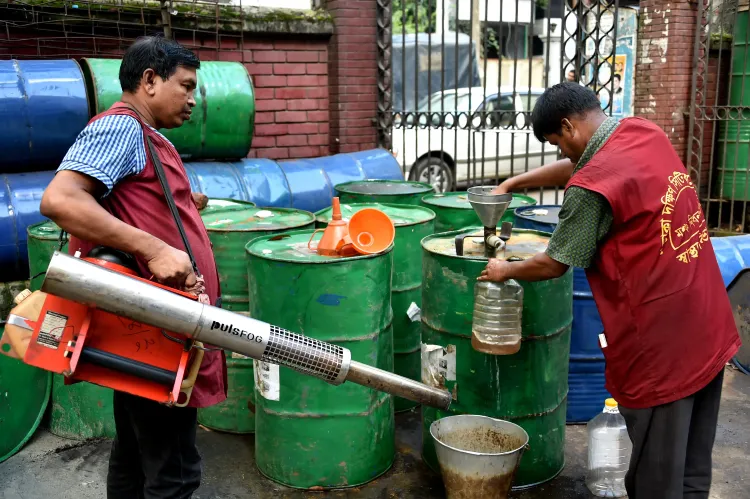Why are dengue fatalities rising in Bangladesh?

Synopsis
Key Takeaways
- Dengue fatalities have reached 220 in 2025.
- 700 new hospitalizations reported in the last 24 hours.
- Health authorities stress early detection and treatment.
- Delays in hospitalization are leading to increased deaths.
- The importance of effective mosquito control cannot be overstated.
Dhaka, Oct 8 (NationPress) Three additional individuals have succumbed to dengue in Bangladesh within the last 24 hours, according to reports from local media. This latest surge has pushed the death toll from this mosquito-borne illness in 2025 to 220.
During this timeframe, 700 more patients were hospitalized with viral fever, raising the cumulative total of dengue cases to 52,104, as reported by the Directorate General of Health Services (DGHS). The recent fatalities were recorded in both the Dhaka South City Corporation (DSCC) and Dhaka North City Corporation (DNCC), according to the United News of Bangladesh (UNB).
The DGHS disclosed that new cases emerged in various regions: Dhaka North City Corporation (155), Dhaka Division (149), Dhaka South City Corporation (110), Barishal Division (105), Chattogram Division (61), Khulna Division (45), Mymensingh Division (33), Rajshahi Division (31), Rangpur Division (6), and Sylhet Division (5). Currently, 2,473 patients are undergoing treatment in various healthcare facilities across Bangladesh.
In 2024, the country witnessed a total of 575 dengue-related deaths. During that year, 101,214 cases were documented alongside 100,040 recoveries, as per the DGHS.
Dengue is a viral illness caused by the dengue virus (DENV), transmitted to humans through the bites of infected mosquitoes. This disease is prevalent in tropical and subtropical climates worldwide, particularly in urban and semi-urban settings, according to the World Health Organization (WHO). Preventing and controlling dengue hinges on effective vector control. Although there is no specific treatment for dengue, early detection and access to appropriate medical care significantly reduce the fatality rates associated with severe cases.
Last week, Bangladesh's health authorities urged anyone experiencing fever to undergo immediate dengue testing at hospitals and to seek medical assistance if diagnosed positive, as reported by local media on Sunday.
In a conversation with Bangladesh's prominent newspaper, The Daily Star, Abu Hussain Moinul Ahsan, Director (hospital) at the Directorate General of Health Services (DGHS), noted that delayed hospital admissions have been a significant factor contributing to the rise in dengue-related deaths.
The DGHS released a statement indicating, "Primarily, the delay in reaching hospitals has led to complicated dengue infections, leaving little room for effective treatment. Late hospital admissions or delays in consulting doctors complicate treatment for severe cases."
The hospitals have assured that they are well-stocked with necessary medications, saline, and dengue testing kits. However, they emphasized the importance of ensuring timely dengue detection, adhering to treatment guidelines, and simultaneously implementing effective mosquito control measures.









